BOOKS

The Conversation: A Revolutionary Plan for End-of-Life Care
– Angelo Volandes M.D. M.D., 2016
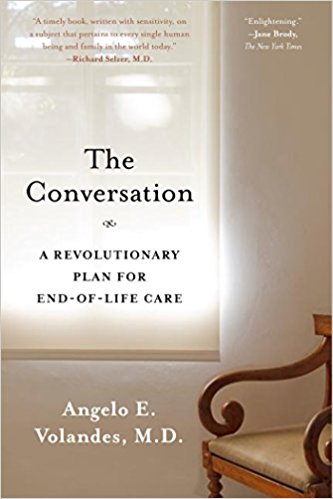 There is an unspoken dark side of American medicine–keeping patients alive at any price. Two thirds of Americans die in healthcare institutions, tethered to machines and tubes at bankrupting costs, even though research shows that most prefer to die at home in comfort, surrounded by loved ones.
There is an unspoken dark side of American medicine–keeping patients alive at any price. Two thirds of Americans die in healthcare institutions, tethered to machines and tubes at bankrupting costs, even though research shows that most prefer to die at home in comfort, surrounded by loved ones.
Dr. Angelo E. Volandes believes that a life well lived deserves a good ending. Through the stories of seven patients and seven very different end-of-life experiences, he demonstrates that what people with a serious illness, who are approaching the end of their lives, need most is not new technologies but one simple thing: The Conversation. He argues for a radical re-envisioning of the patient-doctor relationship and offers ways for patients and their families to talk about this difficult issue to ensure that patients will be at the center and in charge of their medical care.
It might be the most important conversation you ever have.
Dying Well: Peace and Possibilities at the End of Life
– Ira Byock, 1998
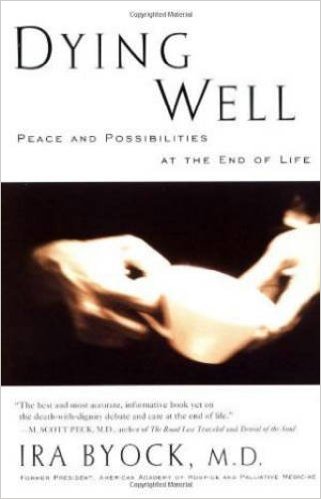 From Ira Byock, prominent palliative care physician and expert in end of life decisions, a lesson in Dying Well.
From Ira Byock, prominent palliative care physician and expert in end of life decisions, a lesson in Dying Well.
Nobody should have to die in pain. Nobody should have to die alone.
This is Ira Byock’s dream, and he is dedicating his life to making it come true. Dying Well brings us to the homes and bedsides of families with whom Dr. Byock has worked, telling stories of love and reconciliation in the face of tragedy, pain, medical drama, and conflict. Through the true stories of patients, he shows us that a lot of important emotional work can be accomplished in the final months, weeks, and even days of life. It is a companion for families, showing them how to deal with doctors, how to talk to loved ones—and how to make the end of life as meaningful and enriching as the beginning.
Ira Byock is also the author of The Best Care Possible: A Physician’s Quest to Transform Care Through the End of Life.
Extreme Measures: Finding a Better Path to the End of Life
– Jessica Nutik Zitter M.D., 2017
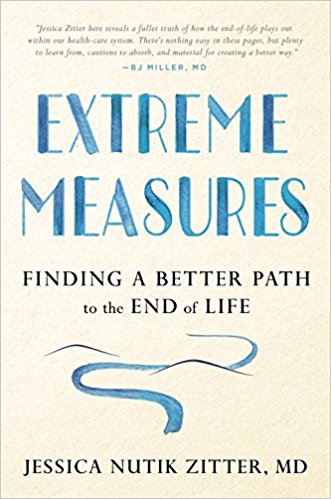 In medical school, no one teaches you how to let a patient die.
In medical school, no one teaches you how to let a patient die.
Jessica Zitter became a doctor because she wanted to be a hero. She elected to specialize in critical care—to become an ICU physician—and imagined herself swooping in to rescue patients from the brink of death. But then during her first code she found herself cracking the ribs of a patient so old and frail it was unimaginable he would ever come back to life. She began to question her choice.
Extreme Measures charts Zitter’s journey from wanting to be one kind of hero to becoming another—a doctor who prioritizes the patient’s values and preferences in an environment where the default choice is the extreme use of technology. In our current medical culture, the old and the ill are put on what she terms the End-of-Life Conveyor belt. They are intubated, catheterized, and even shelved away in care facilities to suffer their final days alone, confused, and often in pain. In her work Zitter has learned what patients fear more than death itself: the prospect of dying badly. She builds bridges between patients and caregivers, formulates plans to allay patients’ pain and anxiety, and enlists the support of loved ones so that life can end well, even beautifully.
Filled with rich patient stories that make a compelling medical narrative, Extreme Measures enlarges the national conversation as it thoughtfully and compassionately examines an experience that defines being human.
Being Mortal: Medicine and What Matters in the End
– Atul Gawande, 2014
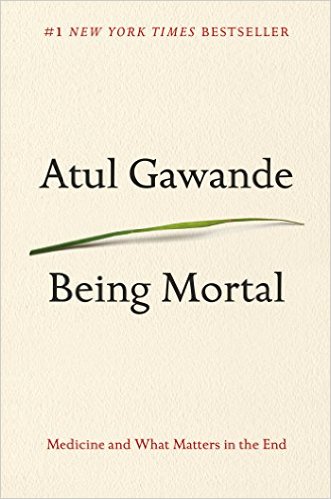 In Being Mortal, bestselling author Atul Gawande tackles the hardest challenge of his profession: how medicine can not only improve life but also the process of its ending
In Being Mortal, bestselling author Atul Gawande tackles the hardest challenge of his profession: how medicine can not only improve life but also the process of its ending
Medicine has triumphed in modern times, transforming birth, injury, and infectious disease from harrowing to manageable. But in the inevitable condition of aging and death, the goals of medicine seem too frequently to run counter to the interest of the human spirit. Nursing homes, preoccupied with safety, pin patients into railed beds and wheelchairs. Hospitals isolate the dying, checking for vital signs long after the goals of cure have become moot. Doctors, committed to extending life, continue to carry out devastating procedures that in the end extend suffering.
Gawande, a practicing surgeon, addresses his profession’s ultimate limitation, arguing that quality of life is the desired goal for patients and families. Gawande offers examples of freer, more socially fulfilling models for assisting the infirm and dependent elderly, and he explores the varieties of hospice care to demonstrate that a person’s last weeks or months may be rich and dignified.
Full of eye-opening research and riveting storytelling, Being Mortal asserts that medicine can comfort and enhance our experience even to the end, providing not only a good life but also a good end.
What Patients Say, What Doctors Hear
–Danielle Ofri, 2017
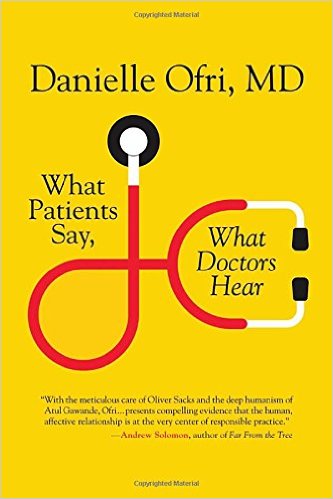 Can refocusing conversations between doctors and their patients lead to better health?
Can refocusing conversations between doctors and their patients lead to better health?
Despite modern medicine’s infatuation with high-tech gadgetry, the single most powerful diagnostic tool is the doctor-patient conversation, which can uncover the lion’s share of illnesses. However, what patients say and what doctors hear are often two vastly different things.
Patients, anxious to convey their symptoms, feel an urgency to “make their case” to their doctors. Doctors, under pressure to be efficient, multitask while patients speak and often miss the key elements. Add in stereotypes, unconscious bias, conflicting agendas, and fear of lawsuits and the risk of misdiagnosis and medical errors multiplies dangerously.
Though the gulf between what patients say and what doctors hear is often wide, Dr. Danielle Ofri proves that it doesn’t have to be. Through the powerfully resonant human stories that Dr. Ofri’s writing is renowned for, she explores the high-stakes world of doctor-patient communication that we all must navigate. Reporting on the latest research studies and interviewing scholars, doctors, and patients, Dr. Ofri reveals how better communication can lead to better health for all of us.
Take Care of Dying—Get On with Living: End-of-life Planning that Works
–Theo Wells, 2016
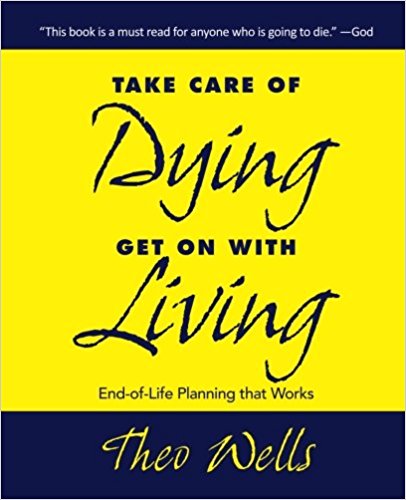 The greatest gift you can give your family and friends is your carefully thought out plan for handling the unexpected events at the end of your life. Here—all in one place—are the basic decisions you need to make as long as you’re living: Your Durable Power of Attorney and your Health Care Directive. Who to choose? What skills to look for? What to do in emergencies? Learn about new issues when you turn terminal. As you know more, you’ll want to decide more. It’s about control. Communicating with your health care professional and your agent—who will speak for you when you can’t—becomes critical. You want them to follow your decisions in your Health Care Directive. None of this is a single conversation—it’s an ever-changing process. It’s your life. These decisions are yours to make. So take charge and make your voice count—now. Just do it!
The greatest gift you can give your family and friends is your carefully thought out plan for handling the unexpected events at the end of your life. Here—all in one place—are the basic decisions you need to make as long as you’re living: Your Durable Power of Attorney and your Health Care Directive. Who to choose? What skills to look for? What to do in emergencies? Learn about new issues when you turn terminal. As you know more, you’ll want to decide more. It’s about control. Communicating with your health care professional and your agent—who will speak for you when you can’t—becomes critical. You want them to follow your decisions in your Health Care Directive. None of this is a single conversation—it’s an ever-changing process. It’s your life. These decisions are yours to make. So take charge and make your voice count—now. Just do it!
Patients, anxious to convey their symptoms, feel an urgency to “make their case” to their doctors. Doctors, under pressure to be efficient, multitask while patients speak and often miss the key elements. Add in stereotypes, unconscious bias, conflicting agendas, and fear of lawsuits and the risk of misdiagnosis and medical errors multiplies dangerously.
Though the gulf between what patients say and what doctors hear is often wide, Dr. Danielle Ofri proves that it doesn’t have to be. Through the powerfully resonant human stories that Dr. Ofri’s writing is renowned for, she explores the high-stakes world of doctor-patient communication that we all must navigate. Reporting on the latest research studies and interviewing scholars, doctors, and patients, Dr. Ofri reveals how better communication can lead to better health for all of us.
Knocking on Heaven’s Door: The Path to a Better Way of Death
– Katy Butler, 2014
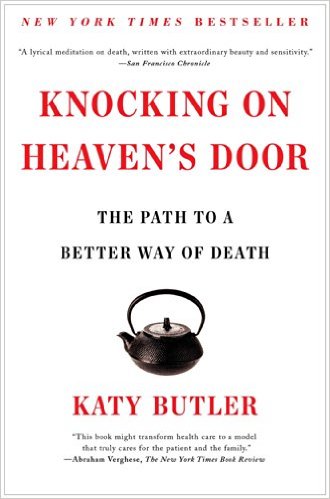 “A thoroughly researched and compelling mix of personal narrative and hard-nosed reporting that captures just how flawed care at the end of life has become.” (Abraham Verghese, T he New York Times Book Review).
“A thoroughly researched and compelling mix of personal narrative and hard-nosed reporting that captures just how flawed care at the end of life has become.” (Abraham Verghese, T he New York Times Book Review).
This groundbreaking blend of memoir and investigative reporting–hailed as “Notable Book of the Year” by The New York Times–ponders the “Good Death” and the forces that stand in its way.
Katy Butler was living thousands of miles away when her old but seemingly vigorous father suffered a crippling stroke. She flew East and in time became her parents’ part-time caregiver, thoroughly re-embroiled in the childhood family dynamics she thought she’d left behind.
Her father’s natural suffering was bad enough. But in time she saw it prolonged by an advanced medical device — a pacemaker — that kept his heart going while doing nothing to prevent his slide into dementia, near-blindness, and misery. When he said, “I’m living too long,” Katy and her mother faced wrenching moral questions, faced by millions of America’s 28 million caregivers. Where is the line between saving a life and prolonging a dying? When do you say to a doctor, “Let my loved one go?”
After doctors refused to disable the pacemaker, Butler set out to understand how we had transformed dying from a natural process to a technological flail. Her quest had barely begun when her mother, faced with her own grave illness, rebelled against her doctors and met death head-on.
Part memoir, part medical history, and part spiritual guide, Knocking on Heaven’s Door is a map through the labyrinth of a broken medical system. Its provocative thesis is that technological medicine, obsessed with maximum longevity, often creates more suffering than it prevents. It also chronicles the rise of Slow Medicine, a movement bent on reclaiming the “Good Deaths” our ancestors prized. In families, hospitals, and the public sphere, this visionary memoir is inspiring passionate conversations about lighting the path to a better way of death.
“A lyrical meditation written with extraordinary beauty and sensitivity” (San Francisco Chronicle).
The Needs of the Dying: A Guide for Bringing Hope, Comfort, and Love to Life’s Final Chapter
–David Kessler, 2007
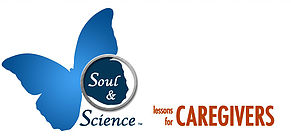
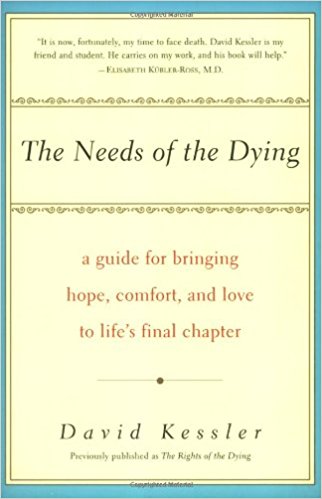 In gentle, compassionate language, The Needs of the Dying helps us through the last chapter of our lives. Author David Kessler has identified key areas of concern: the need to be treated as a living human being, the need for hope, the need to express emotions, the need to participate in care, the need for honesty, the need for spirituality, and the need to be free of physical pain. Examining the physical and emotional experiences of life-challenging illnesses, Kessler provides a vocabulary for family members and for the dying that allows them to communicate with doctors, with hospital staff, and with one another, and—at a time when the right words are exceedingly difficult to find—he helps readers find a way to say good-bye. Using comforting and touching stories, he provides information to help us meet the needs of a loved one at this important time in our lives.
In gentle, compassionate language, The Needs of the Dying helps us through the last chapter of our lives. Author David Kessler has identified key areas of concern: the need to be treated as a living human being, the need for hope, the need to express emotions, the need to participate in care, the need for honesty, the need for spirituality, and the need to be free of physical pain. Examining the physical and emotional experiences of life-challenging illnesses, Kessler provides a vocabulary for family members and for the dying that allows them to communicate with doctors, with hospital staff, and with one another, and—at a time when the right words are exceedingly difficult to find—he helps readers find a way to say good-bye. Using comforting and touching stories, he provides information to help us meet the needs of a loved one at this important time in our lives.